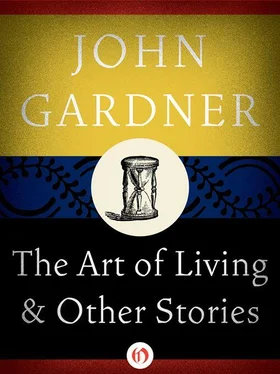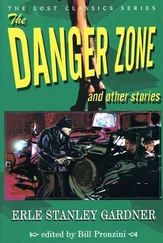Angelina was half sitting, half leaning on the barstool, one leg bent at the knee, as in a movie-ad, mocking by her very existence the enormous human brain. It came to me that she was listening, as interested as any of the rest of us, though she pretended not to be, and then it came to me that Arnold Deller knew it. I wondered if her father did.
The cook started counting things off on his fingers, never looking for as much as a second at Angelina. He sat mounded forward over the table, leaning on his elbows, urgent. “We’re social animals. We’re no good if we don’t run in packs, like you guys. Take one of you alone — even Benny the Butcher here — why a half-starved alleycat could knock him over! But it’s not only that. Even when we pretend to be otherwise — like you, Finnegan.” He pointed at me and closed one eye, very grim, lips trembling. “Even if we pretend it’s otherwise, we like to run in packs. We get lonely. We want something to love and protect.” He wagged his head toward Angelina and winked, not humorously, as he no doubt intended it, but somehow horribly, the way a severed head might wink. I shot a glance at her father, then another one at Arnold, startled. He raised his hand, palm out, all innocence. “Okay,” he said, “so, one , we’re social animals. We gotta live with that. It’s one of those big instincts you can’t get away from — comes of having babies that can’t fend for themselves. Parents gotta stick with ’em enough to take care of ’em, so little by little, through the centuries, as Mr. Darwin says — you should get somebody to read him to you, Finnegan — ha ha! ha ha! — little by little through the centuries human beings got more and more loving until now, the way we are, it’s almost like a sickness, all that anguish of love — but cheer up, it’s even worse with whales. Okay, so where was I? Okay.” Suddenly, like a fist closing, his face closed into a frown.
Benny the Butcher looked at me, suspecting something, then went back to looking at the table and shaking his head. There was nothing I could tell him. I wasn’t sure what was happening myself. The cook was always a little crazy, a little rhetorical and preachy, but something was going on that wasn’t quite usual, that was clear. The room was building up a charge, as if it were the furniture, the dark red walls that had slipped toward not-quite-sane. I felt restless, in need of space and air, but also I wanted Arnold Deller to keep talking. Even if he was making some kind of play for Angelina — it was a weird idea, but it crossed my mind — I had a feeling the talk was in some strange way getting at something. Angelina sat aloof, poised like a bird on a wire. Her father stood with his back to her, only his arms moving, mechanically washing glasses.
“Okay,” Arnold said, “but what else we know is, two , we got a war instinct, also on account of the baby.” He aimed a finger at me like a gun. “Any animal can fight — duck, wolf, bear — but human beings are serious about it. You ever wonder about that? It’s all on account of those babies, that’s what I figure. Ordinary mating fight, usually sooner or later one of the males will back off, except horses. Horses are nuts. But human babies, that changes things. You gotta protect the nest till the baby can walk and talk, learn to make fire, hunt and cook. That takes a long time. Ten years? Twelve? It’s no good just knocking off an enemy now and then. You gotta clean out that forest, make the whole place safe. So the baby that survives is the one with the parents that are the best at holding grudges, the ones that are implacable. ” He looked at Lenny the Shadow, who had his mouth open, ready to break in. “Look it up, kid,” Arnold said. “Ask your priest.”
Lenny raised his eyebrows and his hands and looked at me, innocent and injured, surprised by the attack. “Is there no justice? ” his look said. There was no justice.
Arnold was digging in, cutting rock. He leaned forward on his elbows again, sweat shining on his face, and looked straight at me as if he’d forgotten the others were there. “But ah,” he said, “that’s where the trouble starts, you can see that yourself! The parents love the baby, and love each other, of course, or they wouldn’t stay together and protect the baby, and pretty soon they learn to love their relatives and neighbors, since that also helps survival, and after a while, after centuries and centuries, they learn to love dead relatives and whatever bits of wisdom they may have scratched on pieces of wood or stone before they died. What a conspiracy! The family and neighbors both living and dead, all standing guard over the poor helpless baby! But they hate — repeat, hate —the enemy, the stranger.” He threw a sharp look at Joe behind the bar — Angelina looked at him too — but Joe, it seemed, noticed none of it.
“All very well,” Arnold said, “as long as people stay in tight little groups. But what happens when Italians and Irishmen start trying to live in the same town? Or Englishmen and Welshmen, Germans, Jews, Chinamen, black men? When that begins to happen we’ve gotta expand our horizons, retrain our instincts a little.” He lowered his head and pointed at my nose. “We invent civilization and law courts, even figure out ways of loving the dead relatives of those other guys — dead relatives who said terrible things about our own dead relatives. That’s when you’ve gotta use your head — you see? Love by policy, not just instinct. That’s the Art of Living. Not just instinct; something you do on purpose. Art!” He was practically shouting.
It may be clear to you by now what was happening, part of it anyway, but it wasn’t clear to me. My heart was pounding and I could feel the blood rushing up, stinging my cheeks, though I managed to keep my cool muscle-smile. It didn’t quite seem to me that the cook had gone really, literally insane, and I was sure he wasn’t drunk, but why he was yelling at me, apparently trying to make a fool of me, I was in too much of a panic to understand. Even the weird things Tony Petrillo said seemed to make more sense.
“You got it all figured out,” I said. “I gotta hand it to you, Arnold.” Smiling; voice soft, as if I weren’t actually there, just a projection beamed down from a spaceship. I had a feeling Angelina was looking at me, but when I glanced over at her, she wasn’t. Her partly turned-away face was dark, as if she too were blushing.
It must finally have occurred to Arnold Deller that none of us was getting it, with the possible exception of Joe, behind the bar. Arnold suddenly grinned and drew back. “Crazy talk from a cook, eh?” he said, and gave a laugh.
“Hey, listen, man,” Lenny the Shadow began, but then, whatever he’d meant to say, he forgot it, just sort of faded back into the darkness.
“I’ll tell you this,” the cook said. “Art’s where it all comes together, that’s what we’re talking about. You take a good Chinese dinner, something very special.” He shot a quick nervous look over at Joe and Angelina. The way he was rolling his eyes, it was like one of those old-time Eisenstein movies. “My boy Rinehart, over there in Viet Nam—”
Quickly, we all nailed our eyes to the table. It was the worst trick he had, that way of talking about his son as if everything were fine. He’d always fake a smile and raise his eyebrows — he didn’t even know he was doing it — and his lips would tremble and his voice would cloud over and more often than not his eyes would fill with tears. It should have made us sad, theoretically, but I guess the truth is it made us feel creepy, crowded in on, a little disgusted. If he’d done it any oftener, we’d have quit going by.
“My boy Rinehart had a certain dish over there in Asia, a certain dish you might think no American would touch, given our prejudices. But it was made so perfectly, it was so downright outstanding, sooner or later you just had to give in to it. That’s what he wrote. I’ve got the letter. It wasn’t just food, it was an occasion. It was one of the oldest dishes known in Asia. Sit down to that dinner — this is what he wrote, and he was right, dead right — you could imagine you were eating with the earliest wisemen in the world.”
Читать дальше












